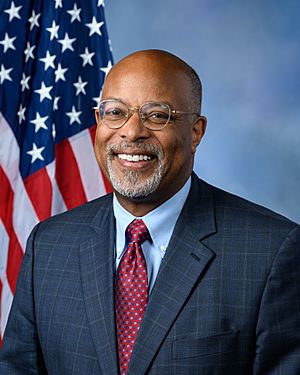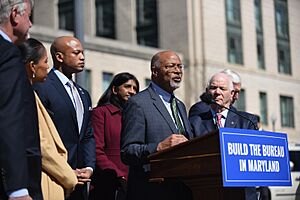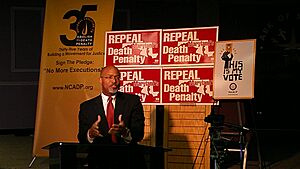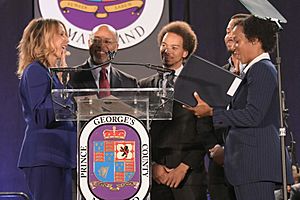Glenn Ivey facts for kids
Quick facts for kids
Glenn Ivey
|
|
|---|---|
 |
|
| Member of the U.S. House of Representatives from Maryland's 4th district |
|
| Assumed office January 3, 2023 |
|
| Preceded by | Anthony Brown |
| State's Attorney of Prince George's County | |
| In office January 6, 2003 – January 3, 2011 |
|
| Preceded by | Jack B. Johnson |
| Succeeded by | Angela Alsobrooks |
| Chair of the Maryland Public Service Commission | |
| In office March 18, 1998 – October 31, 2000 |
|
| Governor | Parris Glendening |
| Preceded by | Russell Frisby |
| Succeeded by | Catherine Riley |
| Personal details | |
| Born |
Glenn Frederick Ivey
February 27, 1961 Chelsea, Massachusetts, U.S. |
| Political party | Democratic |
| Spouse | |
| Children | 6, including Julian |
| Residences | Cheverly, Maryland, U.S. |
| Education | Princeton University (BA) Harvard University (JD) |
| Signature |  |
| Website | |
Glenn Frederick Ivey (born February 27, 1961) is an American politician and lawyer. Since 2023, he has been the U.S. representative for Maryland's 4th congressional district. A U.S. representative is a person elected to the United States House of Representatives to help make laws for the country.
His district includes many of the Black-majority communities in Maryland near Washington, D.C. Before joining Congress, Ivey was the top lawyer, or State's Attorney, for Prince George's County, Maryland, from 2002 to 2011. He won the election for his congressional seat in 2022.
Ivey has a long history of working in government. He was an advisor to important leaders like Senate Majority Leader Tom Daschle and Senator Paul Sarbanes. He also worked with U.S. Representative John Conyers and former U.S. Attorney General Eric Holder.
Contents
Early Life and Schooling
Glenn Ivey was born in Chelsea, Massachusetts. He grew up in Rocky Mount, North Carolina. In Rocky Mount, his mother was the first Black teacher at a school that previously only had white students.
Later, his family moved to Dale City, Virginia, because his father got a job with the U.S. government. Ivey was a great student and graduated with honors from Princeton University in 1983. He then went to Harvard Law School and earned his law degree in 1986.
Career in Law and Government
After law school, Ivey began his career working for a law firm in Baltimore. He soon moved to Washington, D.C., to work on Capitol Hill as an aide to U.S. Representative John Conyers.
Early Government Roles
In 1989, Ivey became an assistant U.S. attorney in Washington, D.C. This job involved representing the government in court cases. He later returned to Capitol Hill to work for the U.S. Senate Banking Committee. He also served as a lawyer for Senator Paul Sarbanes during the Senate's Whitewater investigations.
In 1998, Maryland's governor appointed Ivey to be the chairman of the Maryland Public Service Commission. This group makes sure that utility companies, like those for electricity and phones, are fair to customers. He left this role in 2000 to work at a private law firm.
State's Attorney for Prince George's County
In 2002, Ivey was elected as the State's Attorney for Prince George's County. He was the county's top prosecutor, in charge of the lawyers who handle criminal cases. He was elected to this position twice and served until 2011.
During his time as State's Attorney, Ivey worked to reduce crime. He also introduced new ideas, like putting cameras in police interview rooms. He often worked with community groups and religious leaders to find better ways to keep people safe.
After serving as State's Attorney, Ivey returned to working at law firms. He also taught law at Harvard Law School and the University of Maryland School of Law.
In 2020, Ivey was asked to lead a task force to suggest improvements for the county's police department. The group recommended new ways for police to work with the community and be more accountable.
U.S. House of Representatives
Ivey was sworn into the United States House of Representatives on January 3, 2023. In Congress, he serves on important committees that decide how the government spends money and that make sure government officials follow the rules.
Committee and Caucus Memberships
Ivey is a member of several groups in Congress called caucuses. These groups work together on specific issues. Some of the caucuses he belongs to include:
- Congressional Black Caucus
- New Democrat Coalition
- Gun Violence Prevention Task Force
- Sustainable Energy and Environment Coalition
In July 2024, Ivey was chosen to be on a special bipartisan task force. This group was formed to investigate the attempted assassination of former President Donald Trump.
Running for Office
Ivey first ran for Congress in 2016 but did not win the primary election. A primary election is a vote where a political party chooses its main candidate for the final election.
In 2022, he ran again for Maryland's 4th congressional district. This time, he won the Democratic primary election. He then went on to win the main election in November 2022 with a large majority of the votes.
What Glenn Ivey Believes In
Here are some of Glenn Ivey's views on important topics.
Capital Punishment
When he first became a State's Attorney, Ivey supported the death penalty, also known as capital punishment. This is when a person is executed for a very serious crime.
Over time, his views changed. By 2009, he said he no longer supported it, partly because of how the long process affected the families of victims. He later helped pass a law in 2013 that ended the death penalty in Maryland.
Gun Policy
As a prosecutor, Ivey wanted stricter punishments for people who had guns illegally. He supports policies like background checks for all gun purchases and a ban on certain types of military-style rifles.
In 2023, he introduced a bill in Congress called the Raise The Age Act. This law would change the legal age to buy some types of rifles from 18 to 21.
Other Issues
- Healthcare: Ivey supports Medicare for All, a plan for a national health insurance program for everyone.
- Israel: He supports a two-state solution, where both Israelis and Palestinians would have their own independent countries. He also supports funding for Israel's Iron Dome defense system.
- Police: Ivey does not support the "Defund the Police" movement. He believes in giving police departments the resources they need while also holding officers responsible for their actions.
- Social Issues: In 2012, he supported a Maryland law that legalized same-sex marriage.
Personal Life
Ivey is married to Jolene Ivey, who is also involved in Maryland politics. They have been married since 1988 and have six children. One of their sons, Julian Ivey, is a delegate in the Maryland state government. The family lives in Cheverly, Maryland.
In 2004, Ivey had surgery to remove a small cancerous tumor from his kidney. The surgery was successful because the cancer was found early, and he has been cancer-free ever since.
Electoral history
| Party | Candidate | Votes | % | |
|---|---|---|---|---|
| Democratic | Anthony Brown | 47,678 | 41.6 | |
| Democratic | Glenn F. Ivey | 38,966 | 34.0 | |
| Democratic | Joseline Peña-Melnyk | 21,724 | 19.0 | |
| Democratic | Warren Christopher | 3,973 | 3.5 | |
| Democratic | Matthew Fogg | 1,437 | 1.3 | |
| Democratic | Terence Strait | 845 | 0.7 | |
| Party | Candidate | Votes | % | |
|---|---|---|---|---|
| Democratic | Glenn Ivey | 42,791 | 51.8 | |
| Democratic | Donna Edwards | 29,114 | 35.2 | |
| Democratic | Angela Angel | 4,678 | 5.7 | |
| Democratic | Tammy Allison | 1,726 | 2.1 | |
| Democratic | Kim A. Shelton | 1,354 | 1.6 | |
| Democratic | Gregory Holmes | 1,024 | 1.2 | |
| Democratic | James Curtis Jr. | 763 | 0.9 | |
| Democratic | Matthew Fogg | 663 | 0.8 | |
| Democratic | Robert K. McGhee | 549 | 0.7 | |
| Party | Candidate | Votes | % | |
|---|---|---|---|---|
| Democratic | Glenn Ivey | 144,168 | 90.1 | |
| Republican | Jeff Warner | 15,441 | 9.6 | |
| Write-in | 400 | 0.3 | ||
See also
 | John T. Biggers |
 | Thomas Blackshear |
 | Mark Bradford |
 | Beverly Buchanan |




